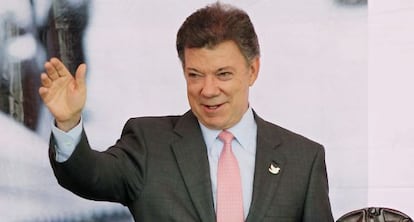Colombia tries to reboot FARC talks
Guerrilla group angry that Santos suspended negotiations when it kidnapped a general

The crisis that has cut through the peace process between the Colombian government and the FARC guerrilla group is not quite over yet.
President Juan Manuel Santos announced that the two-year-old talks were off after the rebel group abducted General Rubén Darío Alzate and two aides in mid-November. But following their release, it looks like resuming the negotiations might not be that easy.
The FARC is now accusing Santos of betraying their trust by suspending talks because of the general’s abduction. One of the rules set out at the beginning was that peace negotiations would take place without a ceasefire.
“Those who imposed the suspension of the conversations cannot come back now and try to impose the date they will restart, as though nothing had happened,” said FARC leaders in a statement released Monday night.
In Havana, which is hosting the talks, members of both delegations have been meeting since Monday to assess the progress made in these last two years. The point, said the president, is “to see how we can take it from here.”
Santos, who was re-elected to a second term in June on the strength of his peace process with the guerrilla group, does not feel that the abduction and release of General Alzate has hurt the negotiations significantly — although many Colombians disagree with that view.
“This thing that happened, and the way in which it was resolved, shows the maturity of the process, and I hope that the talks between the negotiators and the guerrilla delegates will allow us to come up with an assessment,” said Santos in an interview on RCN La Radio.
But the FARC now insist that new rules of the game must be drawn up.
Both sides agree, however, that the time has come to move “from discussion to action.” The government’s chief negotiator, Humberto de la Calle, said that the kidnapping created the need for “gestures that will prove to Colombians that we are nearing the end of the conflict.” By this he meant reducing the intensity of the ongoing warfare.
Alzate got his institution and his country into trouble, and he realized it” President Santos
In his interview on RCN, Santos said that this possibility has been on the table for a while. “It’s possible and I think it’s necessary,” he said, without adding any further details.
The FARC have been insisting on the need for a bilateral ceasefire, but Santos has ruled it out because he does not want the guerrilla to use this time to build up its military power, as it did in the past.
“Rather than continue the process, what we are debating is how to complete it. Processes take their time, and we need to step on the gas. The sooner we end this, the more lives we will save,” said the president.
But while both sides figure it out in Havana, Colombians are still reeling over General Alzate’s announcement that he is leaving the army, made just a few hours after his release. Alzate admitted that he violated the protocols for someone of his rank, which made it easier for him to be abducted in the jungle area northwest of the country.
On Monday night, wearing his full dress uniform and flanked by his wife and two children, Alzate resigned after 33 years in the military. He said he was resigning out of dignity, after being handcuffed and chained during his abduction, and forced to participate in “a media circus” organized by the FARC, who took pictures and videos of him surrounded by guerrilla fighters.
One of these photographs created great controversy in Colombia, as it depicts Alzate embracing FARC negotiator Pastor Alape, who traveled from Cuba to supervise his release. While this could be a sign of reconciliation to some, others consider it a disgrace to see the general and his enemy in the same picture together.
Santos accepted the resignation and said about Alzate that “he got his institution and his country into trouble, and he realized it.”
Tu suscripción se está usando en otro dispositivo
¿Quieres añadir otro usuario a tu suscripción?
Si continúas leyendo en este dispositivo, no se podrá leer en el otro.
FlechaTu suscripción se está usando en otro dispositivo y solo puedes acceder a EL PAÍS desde un dispositivo a la vez.
Si quieres compartir tu cuenta, cambia tu suscripción a la modalidad Premium, así podrás añadir otro usuario. Cada uno accederá con su propia cuenta de email, lo que os permitirá personalizar vuestra experiencia en EL PAÍS.
¿Tienes una suscripción de empresa? Accede aquí para contratar más cuentas.
En el caso de no saber quién está usando tu cuenta, te recomendamos cambiar tu contraseña aquí.
Si decides continuar compartiendo tu cuenta, este mensaje se mostrará en tu dispositivo y en el de la otra persona que está usando tu cuenta de forma indefinida, afectando a tu experiencia de lectura. Puedes consultar aquí los términos y condiciones de la suscripción digital.








































